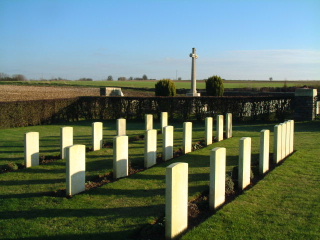Somme
Cemeteries

Researching someone who fought on the
Somme? Visit my WW1
Research Page.
In Martin and
Mary Middlebrook’s excellent comprehensive guide to
the Somme battlefields, the authors state that there are
243 British military cemeteries in the department of the
Somme. Of these 135 are cemeteries which contain burials
from the 1915-16 period, totaling some 110,752 graves.
The Somme has now entered the popular consciousness as
one of the great, tragic battles of the First World War.
Unlike any other battle, because of the high
contribution of volunteer, or ‘Pals’ battalions, it
is often perceived that a whole generation of young men
fell in the 1916 battle. What is beyond dispute is that
127,751 soldiers from Britain and the Commonwealth died
from 1st July until 18th November
1916, and 5,314 died in the months leading up to the
battle.
Although no
accurate figures are seemingly available for the Somme
front, it is likely that there were somewhere in the
region of 300-500 British military cemeteries on the
battlefield by 1918, some of these small cemeteries of
only a few graves from a particular battalion, brigade
or division. The then Imperial War Graves Commission (IWGC)
felt it was impossible to maintain all these burial
sites, some of them in very isolated locations. A
decision was therefore made to concentrate graves: keep
some and move the majority into larger cemeteries. This
resulted in the construction of 165 British military
cemeteries on the 1916 battlefield, some thirty of which
also contain graves from the 1917-18 period.
The main
types of Somme cemeteries are:
 |
Early
Cemeteries: these are ones made when the British
army first arrived on the Somme, or were extensions
of existing French military cemeteries. They
normally are dominated by graves from the lead-up
period to the Battle of the Somme. Some good
examples are Point 110 Old and New, Citadel
Cemetery, and Auchonvillers Communal Cemetery.
|
 |
Battlefield
Cemeteries: burial grounds started following the
commencement of the battle of 1st July 1916. These
are often related to particular battalions or
formations, are close to the site of the action and
can also be mass graves. Good examples which still
survive include the Devonshire and Gordon Cemeteries
at Mametz, and the Hawthorn Ridge and Redan Ridge
cemeteries near Beaumont Hamel.
|
 |
Behind
the Lines Cemeteries: cemeteries close to the
location of medical establishments such as Advanced
Dressing Stations (ADS) or Casualty Clearing
Stations (CCS). One of the largest is Heilly Station
Cemetery, but others include Auchonvillers Military
Cemetery and Albert Communal.
|
 |
Concentration
Cemeteries: post-war burial grounds made by the
IWGC, often on the site of a handful or graves or a
small battlefield cemetery. Most are large, with
several thousand burials each; such as Serre Road No
2, London Cemetery Extension and Delville Wood.
|